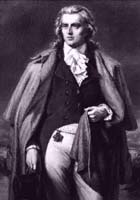Human Knowledge Poem by Friedrich Schiller
Human Knowledge
Since thou readest in her what thou thyself hast there written,
And, to gladden the eye, placest her wonders in groups;--
Since o'er her boundless expanses thy cords to extend thou art able,
Thou dost think that thy mind wonderful Nature can grasp.
Thus the astronomer draws his figures over the heavens,
So that he may with more ease traverse the infinite space,
Knitting together e'en suns that by Sirius-distance are parted,
Making them join in the swan and in the horns of the bull.
But because the firmament shows him its glorious surface,
Can he the spheres' mystic dance therefore decipher aright?
Words used in this poem are different. Are they English words we are using today? It is hard to comprehend the poem with these unfamiliar words.
Schiller's poem questions - and cautions - concerning Human Knowledge. I think he would be satisfied with a measure of humility among scientists, but for himself he seems in this poem to draw a narrower line. //... SO THAT HE WITH MORE EASE MAY TRAVERSE INFINITE SPACE. Why should a scientist even expect ease? And the word INFINITE mocks the man of learning who thinks his Human Knowledge competes with Nature's wisdom.Schiller referred to the legend of the Veil of Isis, that is, Nature has secrets we violate at our peril. BTW The friendship of Schiller and Goethe is legendary, only ended by Schiller's sad early death. A bronze statue of Schiller stands dramatically in an urban park in my hometown St. Paul MN. Most people have NO IDEA who he is. Some think it's Thomas Jefferson - not a bad guess.
Superb simile similizing an astronomer to a lover. both desire to decipher distinct in their perspective zones; though poet doubts that grace of beauty and surface of sky can awe them full.
The poet takes about the scope of knowledge in this poem and its broad field to muse over in a simply prosaic fashion!
This poem has not been translated into any other language yet.
I would like to translate this poem
Thou dost think that thy mind wonderful Nature can grasp... lovely poem penned